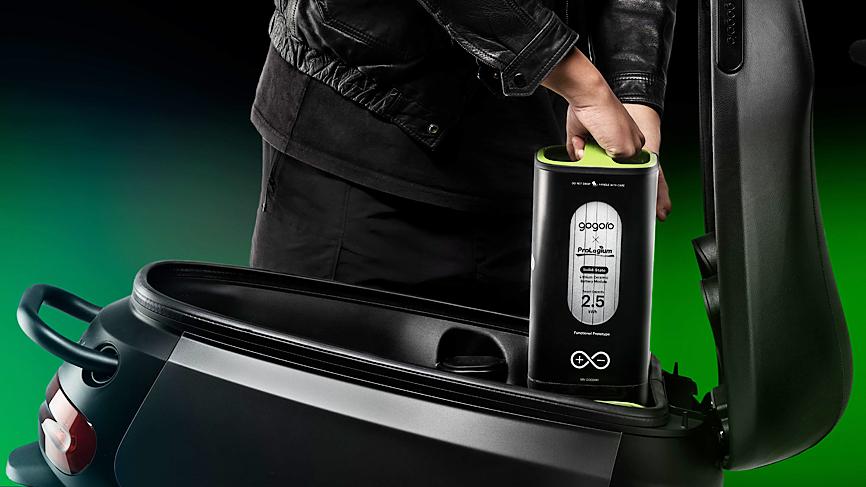Gogoro Inc (睿能創意) yesterday unveiled a prototype solid-state swappable battery that it developed with ProLogium Technology Co (輝能科技), saying that it would provide greater range for its electric scooters.
Gogoro said it plans to introduce the higher-density lithium ceramic batteries in the next three to four years.
The development makes Gogoro a global leader in solid-state lithium ceramic batteries, following similar developments by leading automakers such as Toyota Motor Corp, General Motors Co and Mercedes-Benz.

Photo courtesy of Gogoro Inc
Without flammable liquid electrolytes, solid-state lithium ceramic batteries are considered safer than traditional lithium-ion batteries.
“We partnered with ProLogium Technology, a global leader in solid-state battery innovation, to develop this new battery that delivers higher-energy density for better range, improved stability and safety, and is reverse compatible with all existing Gogoro-powered vehicles,” Gogoro chairman Horace Luke (陸學森) said in a statement.
Gogoro, an electric scooter maker and battery swapping solutions provider, has estimated that its solid-state batteries would increase capacity of its lithium batteries by 47 percent to 2.5 kilowatt-hours (kWh) from 1.7kWh.
Gogoro said that it does not plan to make an equity investment in ProLogium.
The company said that it would start introducing the batteries for its various generations of electric scooters when the technology strikes a balance between manufacturing costs, power capacity and safety.
Since 2015, Gogoro has made 1 million lithium-ion battery packs.
Solid-state lithium batteries are mostly the subject of research or are in pilot production and their manufacturing costs are much higher than traditional lithium-ion batteries. No company has successfully commercialized the technology yet.
ProLogium, headquartered in Taoyuan, said that it has made better progress than its global rivals and is building a mass production line in Taoyuan with an annual capacity of 2 gigawatts (GW) to 3GW.
The production line is to start operations at the end of this year, Lisa Hsu (許容禎), the company’s deputy director for marketing, said yesterday.
The company believes that it has a good opportunity to reduce the manufacturing costs of solid-state ceramic batteries to a level similar to traditional lithium-ion batteries over the next few years, when its battery manufacturing capacity increases to about 30GW, Hsu said.
ProLogium has provided nearly 8,000 solid-state battery cells to global automakers for testing and module development since its establishment in 2006.

SEMICONDUCTORS: The German laser and plasma generator company will expand its local services as its specialized offerings support Taiwan’s semiconductor industries Trumpf SE + Co KG, a global leader in supplying laser technology and plasma generators used in chip production, is expanding its investments in Taiwan in an effort to deeply integrate into the global semiconductor supply chain in the pursuit of growth. The company, headquartered in Ditzingen, Germany, has invested significantly in a newly inaugurated regional technical center for plasma generators in Taoyuan, its latest expansion in Taiwan after being engaged in various industries for more than 25 years. The center, the first of its kind Trumpf built outside Germany, aims to serve customers from Taiwan, Japan, Southeast Asia and South Korea,

Nvidia Corp chief executive officer Jensen Huang (黃仁勳) on Monday introduced the company’s latest supercomputer platform, featuring six new chips made by Taiwan Semiconductor Manufacturing Co (TSMC, 台積電), saying that it is now “in full production.” “If Vera Rubin is going to be in time for this year, it must be in production by now, and so, today I can tell you that Vera Rubin is in full production,” Huang said during his keynote speech at CES in Las Vegas. The rollout of six concurrent chips for Vera Rubin — the company’s next-generation artificial intelligence (AI) computing platform — marks a strategic

Gasoline and diesel prices at domestic fuel stations are to fall NT$0.2 per liter this week, down for a second consecutive week, CPC Corp, Taiwan (台灣中油) and Formosa Petrochemical Corp (台塑石化) announced yesterday. Effective today, gasoline prices at CPC and Formosa stations are to drop to NT$26.4, NT$27.9 and NT$29.9 per liter for 92, 95 and 98-octane unleaded gasoline respectively, the companies said in separate statements. The price of premium diesel is to fall to NT$24.8 per liter at CPC stations and NT$24.6 at Formosa pumps, they said. The price adjustments came even as international crude oil prices rose last week, as traders

Taiwan Semiconductor Manufacturing Co (TSMC, 台積電), which supplies advanced chips to Nvidia Corp and Apple Inc, yesterday reported NT$1.046 trillion (US$33.1 billion) in revenue for last quarter, driven by constantly strong demand for artificial intelligence (AI) chips, falling in the upper end of its forecast. Based on TSMC’s financial guidance, revenue would expand about 22 percent sequentially to the range from US$32.2 billion to US$33.4 billion during the final quarter of 2024, it told investors in October last year. Last year in total, revenue jumped 31.61 percent to NT$3.81 trillion, compared with NT$2.89 trillion generated in the year before, according to